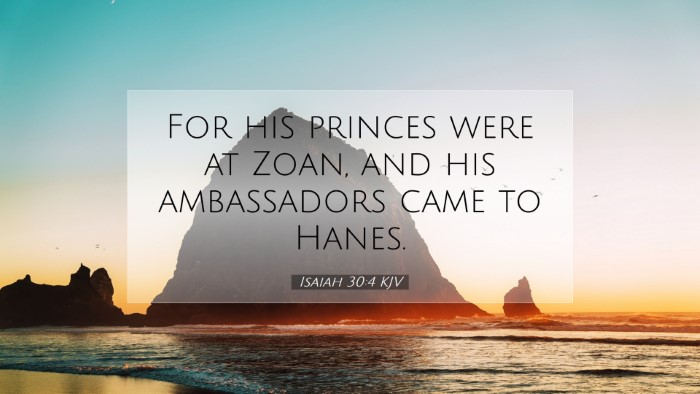Commentary on Isaiah 30:4
Isaiah 30:4: "For his princes were at Zoan, and his ambassadors came to Hanes."
This passage captivates readers with its implications regarding Israel's reliance on foreign alliances in times of trouble. The context, historical background, and theological themes present a rich canvas for exploration.
Historical Context
The prophet Isaiah addresses a significant moment in Israel's history. The nation of Judah found itself in a precarious position, threatened by the Assyrian empire. Instead of seeking divine guidance, the leaders of Judah were tempted to turn to Egypt for help. Zoan and Hanes, mentioned in this verse, represent strongholds of Egypt, symbolizing the nation’s misplaced trust.
Key Themes
- The folly of reliance on human strength: Isaiah reminds us of the futility of depending on political alliances and military might rather than on God. This theme resonates throughout Scripture, emphasizing the insignificance of human plans in contrast to divine providence.
- Judgment and deliverance: There’s an underlying message of divine judgment impending upon those who seek refuge in Egypt. Yet, amidst judgment, the hope for future restoration is evident within the broader narrative of Isaiah.
Insights from Matthew Henry
Matthew Henry highlights that Judah's leaders sought aid from Egypt instead of relying on the Lord. He emphasizes that the princes’ visits symbolize spiritual blindness. They believed that a treaty with Egypt would bolster their strength, failing to acknowledge that true help comes only from God.
Henry articulates the folly of relying on worldly powers, noting that such alliances lead to disgrace and only serve to obstruct God’s deliverance. He also points out the irony of trusting a nation known for its own instability and vulnerability.
Insights from Albert Barnes
Albert Barnes provides a detailed analysis of the geographic and political significance of Zoan and Hanes. He notes that these cities were hubs of power in Egypt and reflects Judah’s inclination to seek immediate solutions for their problems. In his view, this not only demonstrates a lack of faith but indicates a deeper spiritual malaise within the leaders of Judah.
Barnes further elaborates that such alliances with Egypt were contrary to God's explicit instructions. He cautions that Judah's attempt to secure safety through human means would lead to inevitable downfall, contrasting the temporary security offered by Egypt with the everlasting strength that comes from fidelity to God.
Insights from Adam Clarke
Adam Clarke, known for his encyclopedic knowledge and depth of analysis, interprets this verse as a dire warning. He suggests that turning to Egypt signifies a rejection of God's guidance and a preference for worldly wisdom. He emphasizes the danger associated with alliances that disregard divine sovereignty.
Clarke also remarks on the historical implications of such ties, articulating that Judah’s leaders were blinded by their desire for immediate relief from oppression rather than seeking long-term spiritual restoration. He warns pastors and theologians to apply this lesson in modern contexts, where reliance on secular solutions remains a common pitfall for the church.
Theological Reflections
Overall, Isaiah 30:4 serves as a poignant reminder of the theological principle that God desires trust and obedience from His people. The reliance on Egypt encapsulates a broader spiritual failure that resonates through the ages—where believers seek help from worldly systems instead of the Almighty.
This passage encourages pastors and students of the Word to examine their own lives and ministries. In moments of crisis, are we turning to God or to political and social powers for solutions? The answer to this question is crucial for spiritual integrity and effectiveness in ministry.
Conclusion
In summary, Isaiah 30:4 contains profound insights that stretch beyond its historical context. It serves as a reflection on faith, trust, and the danger of misplaced reliance. Pastors, students, and scholars must wrestle with these themes as they strive to understand and proclaim the fullness of God's message—one that calls for total reliance on Him amid the turbulence of human existence.


